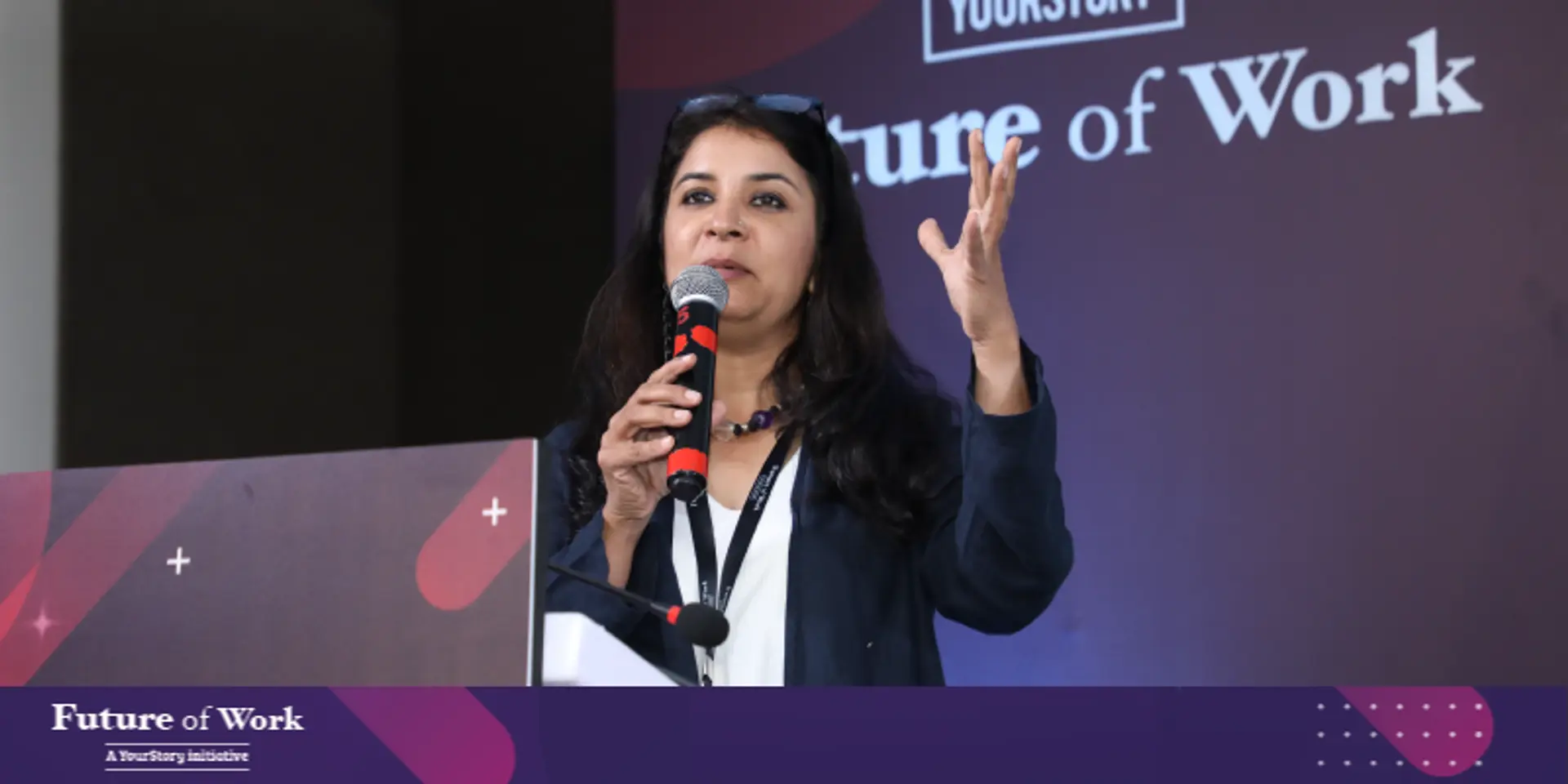Future of Work 2020: Parvathi Menon on how to develop cognitive and behavioural skills at the workplace
Parvathi Menon, Founder and Managing Director of Innovation Alchemy Consulting, reveals why it is important to develop cognitive and behavioural skills among leaders and team members at the workplace.
Rapid technological advancements at the workplace have led to the loss of one of our most important skill sets: soft skills.
As a result, employees end up unable to navigate the resultant office politics, restrictive work culture, unclear or changing work roles, and excessive workloads. This hinders workplace productivity and personal growth, and ultimately affects business development.
At the third edition of YourStory’s Future of Work event, Parvathi Menon, the Founder and Managing Director of Innovation Alchemy Consulting, spoke on how to create a more fluid and flexible work culture and win at the workplace.

Parvathi, who has experience as one of the top learning facilitators on the Harvard Business Review platform
HBR Ascend, shared strategies on dealing with barriers in the workplace, and applying cognitive and behavioural skills to assess and deal with situations better.
Key capabilities for the future of work
Parvathi started her discussion by highlighting the key capabilities for the future of the workplace, and categorised skills into three buckets:
* Leading a Business
* Leading Yourself
* Leading Others
To be able to successfully lead others or even lead a business, you need to know how to manage yourself.
“Developing personal adaptability is extremely important when it comes to navigating yourself through an ambiguous career path,” Parvathi said.
She stressed that this in turn will not only help you to work better in teams, but also understand the art of collaboration, and help your business in the long run.
She questioned the audience, “How many of you’ll face ambiguity in the workplace? What does it look like for you?”
Many audience members opened up about how they struggled when it came to role expectations, lack of understanding and communication between manager and employer, and a frequent shift around requirements.
Parvathy then asked the audience what their reaction was towards this ambiguity, and how it affected them.
The audience responded that they felt a lot of insecurity, confusion, and stagnation, and constantly questioned themselves about their "life path". They went back to their education, rethought their career progression, and contemplated further networking.
Parvathy said while these were powerful responses to the way one views ambiguity in the workplace, we needed to “start seeing the bigger picture”.
Ambiguity is part of the modern workplace
She gave the example of a company expanding its operations, stating that it had a young employee named John who had been performing exceptionally well in his current role. The company planned to relocate him to a different part of Asia as they felt he was the perfect candidate with his Ivy League background, and ability to perform tasks efficiently.
However, things did not go according to plan. John struggled when he relocated as there was a lot of ambiguity and his role was not clearly defined.
“I am providing you with this scenario because this often happens, you are in an environment where you are doing really well and thriving, and then you are moved to a completely new environment, and you struggle,” she said.
She said we needed to understand that these are not inherent aspects of work, but trainable aspects of work and professional life.
“Why are we talking about this? Because ambiguity is an inherent aspect of modern work, and there are no two ways about it,” Parvathi said.
Roles are changing, requirements are changing, and it is all very ambiguous. “However, we can change this. Do we go into it saying it is going to cause me a lot of stress? Or go into it asking what skills we need to learn with every new opportunity?”
She then posed a question to the audience: “What do you think John could have done better when it came to managing his new deployment in Asia?”
While people said that one should be more intuitive, and have the ability to reach out and ask for help, Parvathy stressed on an important point: self-awareness.
“It’s always the way you look at a challenge, your mindset’ she said.
Hone personal agility as a skill
Parvathy highlighted how we needed to develop personal agility like any other skill.
Whether it is in our home environment or workplace, personal agility helps in times of uncertainty and ambiguity. It aids us to remain focused and manage multiple priorities at a time.
“People can develop growth mindsets; people can also develop fixed mindsets. As professionals, we have the ability to adopt both,” Parvathy said.
She stressed on how the more you do difficult things early on in your career, the more it helps when it comes to developing and building a growth mindset.
“In other words, how comfortable are you with being uncomfortable?” she asked.
Embracing change and collaborating for success
Parvathi said the secret to embracing change was personal agility.
She ended her discussion by encouraging people to follow the 7Cs Framework when it comes to embracing change. This comprises:
1. Complexity
2. Clarity
3. Confidence
4. Creativity
5. Commitment
6. Consolidation
7. Change
Agility and leading oneself is imperative to collaborate with a team and get successful results.
“When it comes to collaborating for success, people come together and contribute their expertise for the benefit of shared/group expertise,” Parvathi said.
(Edited by Teja Lele Desai)
A big shout out to our Future of Work 2020 Sponsors: Alibaba Cloud, Larksuite, Vodafone Idea Limited, Gojek, Adobe, Udaan, Pocket Aces, Junglee Games, Sharechat, Open, VestaSpace Technology, Maharashtra State Innovation Society, Kristal.AI and GetToWork; and our Knowledge Partner: Ascend Harvard Business Review.







